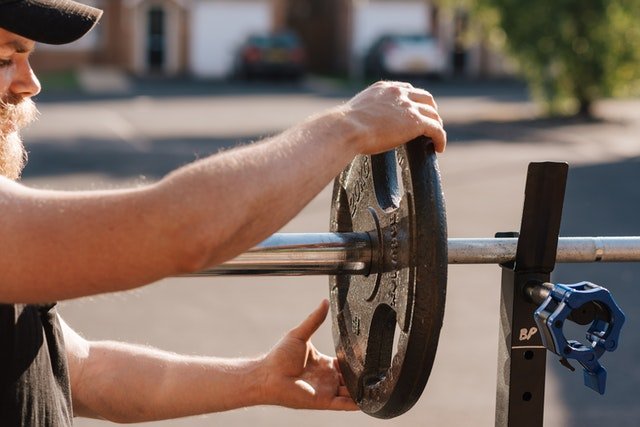How Fast Should My Bench Press Be Increasing As A Beginner? All The Answers For Rapid Progress
So you have decided you are going to join a gym and get started on a fitness program, more to the point a bench pressing program.
The first thing you are going to want to know is how fast your bench press should be increasing as a beginner.
As ever, it’s not as simple as a one size fits all answer and the rate at which your bench press increases will be dictated by a few factors…
How Fast Should My Bench Press Be Increasing As A Beginner?
If you are a beginner, it is recommended that you increase your bench press by 10 pounds each week. If you are struggling to increase your bench press, you can try doing more reps with a lighter weight, or you can try doing fewer reps with a heavier weight. Ultimately, you should aim to increase your bench press by whatever method allows you to safely and effectively progress. Most people plateau around four months in and this is where you have to change up your routine to stimulate new muscle growth. Other factors you must consider are: how much you bench press currently, how frequently you can train, how well you recover from workouts, and how experienced you are with weightlifting in general.
The answer to this question is not as simple as it may seem. How fast you progress will depend on a few factors, such as:
How much do you currently bench press?
This is a pretty basic question, but an important one. Obviously, the heavier you are lifting, the less room you have to grow.
If you are completely new to bench pressing or haven’t worked out in a while, you will be able to add weight much faster than someone who is currently benching their body weight.
Knowing where you are at, to begin with, will give you a good starting point to see how fast you progress.
What are your goals?
After knowing where you’re at, you need to set some goals.
If your goal is to simply get stronger, then your focus should be on adding weight to the bar each week.
However, if your goal is to increase muscular endurance or build a bigger chest, then you will want to focus on increasing reps rather than weight.
Setting achievable and manageable goals is crucial to seeing progress and helping to keep you motivated.
If you are lifting without adequate goals, you will likely find yourself frustrated with your progress (or lack thereof).
How frequently do you train?
If you are only able to train once or twice a week, you will make slower progress than someone who can train 3-4 times per week.
The more frequently you train, the more opportunities you have to stimulate muscle growth.
Training frequency is an important factor to consider when trying to determine how fast your bench press will increase.
Although on the flip side, you don’t want to be over-training, which can lead to injury, fatigue, and a decrease in performance.

How well do you recover from workouts?
This ties in with training frequency.
If you don’t recover well from your workouts, you will make slower progress than someone who recovers quickly.
Recovery is important and overlooked at times because it’s during the recovery process that your muscles actually grow.
If you are constantly putting your body through intense workouts without giving it time to recover, you will eventually hit a wall and your progress will come to a screeching halt.
How experienced are you with weightlifting in general?
If you are new to weightlifting, it’s going to take some time to get used to the movement and learn the proper form.
You will also be building a base of strength and muscle that you can build upon as you become more experienced.
If you have been lifting weights for a while, you will have an advantage in terms of how quickly your bench press will increase.
You will be able to add weight faster and handle more volume because your body is already accustomed to the movement and the stress that is placed on your muscles.
These are just a few factors to consider when trying to determine how fast your bench press will increase as a beginner.
The most important thing to focus on is proper form, training frequency, and recovery. If you focus on these things, the weight will eventually start flying up!
Related: Why Is My Bench Press Not Improving? (All The Answers To Smash Through Plateau)
Big gains to begin with
You will initially see big gains in the beginning because your body is not used to the stress that is being placed on it.
As you become more experienced, the gains will start to slow down because your body has adapted to the training.
The central nervous system (CNS) is responsible for sending signals from the brain to the muscles.
When you first start lifting weights, the CNS is not very efficient at doing this.
As you continue to lift, the CNS becomes more efficient and adapts to the demands being placed on it.
This is one of the reasons why you will see bigger gains in the beginning.
This is why it’s important to change up your routine every 6-8 weeks or so in order to continue making progress.
If you don’t change up your routine, you will eventually hit a plateau and your gains will come to a halt.
Plateau warning
After your body adapts to the initial training, you will start to see your gains slow down.
This is perfectly normal and to be expected.
However, if you hit a plateau where you feel like you are stuck and can’t seem to make any more progress, it’s time to take a step back and reassess your training program.
You might need to increase your training frequency, change up your exercises, or add more weight to the bar.
It’s important to listen to your body and make the necessary changes in order to continue making progress.
Pressing body weight
Once you get to the point where you can bench press your own weight (which may be further down the line I know), the gains will start to slow down.
This is because you are now lifting heavier weights and your body needs more time to recover.
You might need to increase your training frequency or back off on the weight in order to continue making progress.
There is a limit on how much progress can be made, as everyone would have a huge chest if this was the case.
Mix up routine to keep fresh
The key to long-term progress is to keep your body guessing by mixing up your routine.
If you do the same exercises week after week, your body will eventually adapt and the gains will start to slow down.
This is why it’s important to change up your exercises, training frequency, and intensity regularly.
By doing this, you will keep your body guessing and the gains will continue to come.
Consider increasing the weight and reducing the number of reps you do, or vice versa.
Changing up the rep range is also a good way to keep your workouts fresh.
The most important thing to focus on when trying to determine how fast your bench press will increase as a beginner is what is called linear progression.
This means that you should be adding weight to the bar each week, or at the very least every other week.
If you are not seeing any progress after a few weeks, it’s time to take a step back and reassess your training program.
The options are endless, but the key is to keep your body guessing so you can continue making progress.

How often should you train chest as a beginner?
If you are just starting out, it is recommended that you train your chest two times per week.
As you become more experienced, you can increase the frequency to three or four times per week.
Ultimately, it is important to listen to your body and see how it responds to the training.
Some people do well, training chest three or four times per week, while others need to back off to two or three times a week in order to recover properly.
It’s important to experiment and find what works best for you.
Split chest into different sessions
One way to increase the frequency of your chest training is to split it into different sessions.
For example, you can train your upper chest one day and your lower chest another day.
Or you could do a heavy pressing session one day and a lighter volume session another day.
The other thing you could do is do an upper body workout one day and a lower body workout the next day.
This would allow you to hit your chest twice in a row without overtraining it.
There are endless possibilities, but the key is to mix things up so you can keep making progress.
Should you go to failure?
There is a lot of debate on whether or not you should go to failure on your chest workouts.
Some people say you should always train to failure in order to maximize your gains, while others say you should avoid it because it can lead to overtraining.
I believe there is a time and a place for both.
If you are new to weightlifting, I would recommend avoiding training to failure because your body is not used to the stress yet.
You should focus on gradually increasing the weight and getting stronger over time.
Once you have been lifting for a while and your body is adapted to the stress, then you can start training to failure on a more regular basis.
Just be sure to listen to your body and don’t overdo it.
Training to failure can be a great way to break through plateaus, but it can also lead to overtraining if you’re not careful.
Importance of nutrition
Nutrition is also important for increasing your bench press.
You need to make sure you’re eating enough calories and protein in order to gain muscle mass.
Without adequate nutrition, you will not be able to make the gains you want.
A general rule of thumb for protein intake is to consume 1 gram per pound of body weight.
So if you weigh 200 pounds, you should be consuming 200 grams of protein per day.
As for calories, you need to eat enough to support your training but not so much that you start gaining fat.
A good starting point is to eat 500 calories more than your maintenance level.
You can adjust this up or down depending on how your body responds.
If you start gaining too much fat, then you need to eat fewer calories.
And if you’re not gaining any weight, then you need to eat more calories.
Nutrition is a complex topic, but the key is to eat enough to support your training without overdoing it.
In addition to eating enough calories and protein, you also need to make sure you’re getting enough rest.
Your muscles grow when you’re at rest, so it’s important to get plenty of sleep and allow your body to recover.
Related: How Do I Make Leg Day More Bearable? (Everything You Need To Know)
Don’t overlook other muscles in movement
While the chest is the primary muscle worked in the bench press, there are other muscles involved in the movement as well.
The triceps, core and shoulders are also used, as well as your legs for stability, so it’s important to train those muscles as well.
One way to do this is to include exercises like triceps dips and shoulder presses in your routine.
You can also do isolation exercises like triceps extensions and shoulder raises.
The key is to make sure you’re not neglecting other muscles in the movement.
If your bench press starts to stall, it could be because your other muscles are weak and need to be trained more.
Good form guide
It goes without saying that having good form is important for any exercise, but it’s especially important for the bench press.
Since you’re using a heavy weight, there’s a greater risk of injury if you don’t do the exercise properly.
Here are some tips for proper form:
- Start with your back flat against the bench and your feet planted on the ground.
- Take a grip that’s just outside shoulder width.
- Arch your back and squeeze your glutes to stabilize your body.
- Lower the bar to your chest, pause for a moment and then press it back up.
- Keep your elbows tucked in close to your body and your wrists straight.
- Breathe evenly throughout the movement.
- Don’t hold your breath at any point.
If you can’t maintain good form, then the weight is too heavy and you need to lower it.

Forget others expectations
One final tip is to forget about other people’s expectations and focus on your own training.
It doesn’t matter how much someone else can bench press or how fast they’re progressing.
The only thing that matters is how well you’re doing and how well you’re progressing.
If you’re trying to compare yourself to others, you’re only going to get frustrated.
Genetics also play a role in how much you can bench press.
Some people are naturally strong and can gain muscle and strength quickly.
Others have to work a bit harder to make the same gains.
The key is to focus on your own training and not worry about what others are doing.
Final Thoughts…
The bench press is a great exercise for building strength and size.
As a beginner, you should focus on increasing the weight each week and working on your form.
Eating enough calories and protein is also important for making gains.
And finally, don’t forget to train other muscles in the movement, like the triceps, core and shoulders.
If you can do all of these things, you’ll be well on your way to a bigger bench press.
Do you have any tips for improving your bench press? Share them in the comments below!


